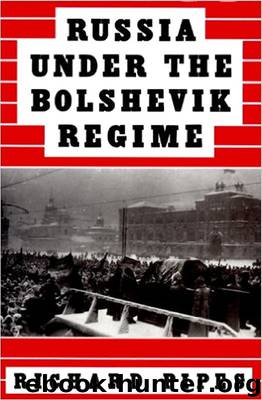Russia Under the Bolshevik Regime by Richard Pipes

Author:Richard Pipes [Pipes, Richard]
Language: eng
Format: epub
ISBN: 978-0-307-78861-0
Publisher: Knopf Doubleday Publishing Group
Published: 2011-05-03T16:00:00+00:00
Communism and “Fascism” have different intellectual origins in that the one is rooted in the philosophy of the Enlightenment and the other in the anti-Enlightenment culture of the Romantic era. In theory, Communism is rational and constructive, “Fascism” irrational and destructive, which is why Communism has always had far greater appeal to intellectuals. In practice, however, this distinction, too, becomes blurred. Here, indeed, “being” determines “consciousness,” in that totalitarian institutions subordinate ideology and reshape it at will. As we have noted, both movements treat ideas as infinitely flexible tools to be imposed on their subjects to enforce obedience and create the appearance of uniformity. In the end, the totalitarianism of the Leninist-Stalinist and Hitlerite regimes, however different their intellectual roots, proved equally nihilistic and equally destructive.
Most telling of all, perhaps, is the admiration that the totalitarian dictators felt for one another. We have mentioned Mussolini’s high regard for Lenin and the praise he lavished on Stalin for turning into a “secret Fascist.” Hitler admitted to intimates respect for Stalin’s “genius”: in the midst of World War II, as his troops were locked in savage combat with the Red Army, he mused about joining forces with him to attack and destroy the Western democracies. The one major obstacle to such collaboration, the presence of Jews in the Soviet government, seemed capable of resolution in light of the assurances that the Soviet leader had given Joachim von Ribbentrop, Hitler’s Foreign Minister, that as soon as he had adequate cadres of gentiles he would remove all Jews from leading positions.121 And, in turn, Mao Zedong, the most radical of Communists, admired Hitler and his methods. When reproached at the height of the Cultural Revolution for sacrificing the lives of so many of his comrades, he responded: “Look at World War II, at Hitler’s cruelty. The more cruelty, the more enthusiasm for revolution.”122
At bottom, the totalitarian regimes of the left and right varieties were united not only by similar political philosophies and practices, but by the common psychology of their founders: its driving motive was hatred and its expression violence. Mussolini, the frankest of them, referred to violence as a “moral therapeutic” because it forced people to make clear commitments.123 In this, and in their determination to raze the existing world in which they felt themselves outcasts, at all costs and by all means, lay their kinship.
Download
This site does not store any files on its server. We only index and link to content provided by other sites. Please contact the content providers to delete copyright contents if any and email us, we'll remove relevant links or contents immediately.
| Africa | Americas |
| Arctic & Antarctica | Asia |
| Australia & Oceania | Europe |
| Middle East | Russia |
| United States | World |
| Ancient Civilizations | Military |
| Historical Study & Educational Resources |
Red Famine: Stalin's War on Ukraine by Anne Applebaum(2918)
Midnight in Chernobyl by Adam Higginbotham(2540)
Chernobyl by Serhii Plokhy(2534)
Midnight in Chernobyl: The Untold Story of the World's Greatest Nuclear Disaster by Adam Higginbotham(2219)
Red Shambhala by Andrei Znamenski(2191)
The House of Government by Slezkine Yuri(2190)
The Gulag Archipelago (Vintage Classics) by Aleksandr Solzhenitsyn(2092)
Red Notice by Bill Browder(2068)
All the Kremlin's Men by Mikhail Zygar(2062)
From Cold War to Hot Peace by Michael McFaul(2027)
Putin's Labyrinth(2015)
From Russia with Lunch by David Smiedt(1969)
The Future Is History by Masha Gessen(1904)
A People's Tragedy by Orlando Figes(1862)
The Romanovs by Simon Sebag Montefiore(1819)
How to Tame a Fox (and Build a Dog): Visionary Scientists and a Siberian Tale of Jump-Started Evolution by Lee Alan Dugatkin & Lyudmila Trut(1760)
The Lost Spy by Andrew Meier(1745)
Putin's Labyrinth: Spies, Murder, and the Dark Heart of the New Russia(1740)
Art and Revolution by John Berger(1720)
